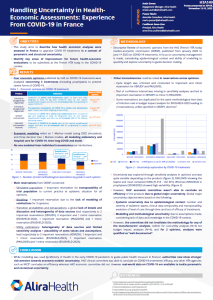Handling Uncertainty in Health-Economic Assessments: Experience from COVID-19 in France
COVID-19 presented healthcare systems with a constantly evolving and uncertain situation. Evaluating the efficiency of treatments in a context of parametric and structural uncertainty was challenging for Health Technology Assessment bodies (HTAs). During the early months of the pandemic the French HTA, Haute Autorité de Santé (HAS), relied on modelling and hypotheses due to the lack of data on the efficacy of treatments created by the variability of variants, ongoing vaccination and continuous evolution of standard of care.
This article explores how economic evaluations were used to appraise COVID-19 treatments in France. The goal is to analyze the impact of the uncertainty surrounding COVID-19 on treatment assessment given by the French economic Committee (CEESP) of HAS and to identify key areas of improvement for future economic evaluations to be submitted to the HAS under uncertain circumstances similar to the COVID-19 pandemic.
Economic Opinion Analysis for COVID-19 Treatments
During the COVID-19 pandemic, CEESP published opinions on three treatments (including prophylaxis) to prevent severe forms of COVID-19. The COVID-19 treatments analyzed were EVUSHELD (tixagevimab/cilgavimab), XEVUDY (sotrovimab), and PAXLOVID (nirmatrelvir/ritonavir). The opinions were based on the outcomes of the economic modeling of one Markov model (using DICE simulation), and three decision trees combined with Markov models, all modeling ambulatory and hospital care for COVID-19, long-COVID, and death.
CEESP’s main reservations in these economic opinions concerned:
- Simulated population: transposability of the clinical trial population to current practice and epidemic situation which evolved very quickly.
- Modeling: lack of modeling of reinfections and lack of data on waning treatment effect in case of reinfections.
- Transition probabilities and extrapolations: a global lack of details and discussion and heterogeneity of data sources
- Utility estimations: heterogeneity of data sources, limited sensitivity analyses, and questions on the plausibility of some values and assumptions
- Other submission inconsistencies CEESP noted were cycle length, deterministic sensitivity analyses without testing the bounds of confidence intervals, and methodological approaches that were not those specified in CEESP’s doctrine.
Ultimately, CEESP did not agree on the efficiency of the products due to global major uncertainty related to the COVID-19 pandemic. Their final decision was based on two main points:
- Systemic uncertainty due to epidemiological context: number and severity of epidemic waves, clinical data temporality and transposability, evolution of level of care through time, and loss of efficacy of treatments.
- Modelling and methodological uncertainty due to assumptions made, considering lack of data and knowledge in the COVID-19 context.
However, CEESP did not invalidate the methodology for any of the manufacturers’ analyses.
Health-Economic Assessments in France Post-Pandemic
While HAS used modelling early in the COVID-19 pandemic to guide public health measures, the CEESP shows stronger risk aversion towards economic models.
Pharma companies should take these criticisms into account when developing new dossiers on future treatments in the specific context of COVID-19. Companies should consider the changing epidemiological context and ask what differences exist in variants and vaccination compared with the clinical trial period. They should also consider the lifecycle of the virus, including re-infection. Real-World Data on COVID-19 could be leveraged to validate modeling results and handle parametric and contextual uncertainty.
Learn More About Handling Uncertainty in Health-Economic Assessments in France
If you would like to learn more about CEESP’s approach to health-economic assessments during COVID-19, download our poster “Handling Uncertainty in Health-Economic Assessments: Experience From COVID-19 in France” presented at ISPOR EU 2023.
References
- https://www.has-sante.fr/upload/docs/application/pdf/2021-09/doctrine_de_la_ceesp_version_anglaise_2021-09-29_11-14-2_803.pdf
- https://modelisation-covid19.pasteur.fr/
- https://www.nice.org.uk/guidance/ta878
- https://www.santepubliquefrance.fr/dossiers/coronavirus-covid-19/coronavirus-chiffres-cles-et-evolution-de-la-covid-19-en-france-et-dans-le-monde
Subscribe to our newsletter for the latest news, events, and thought leadership

